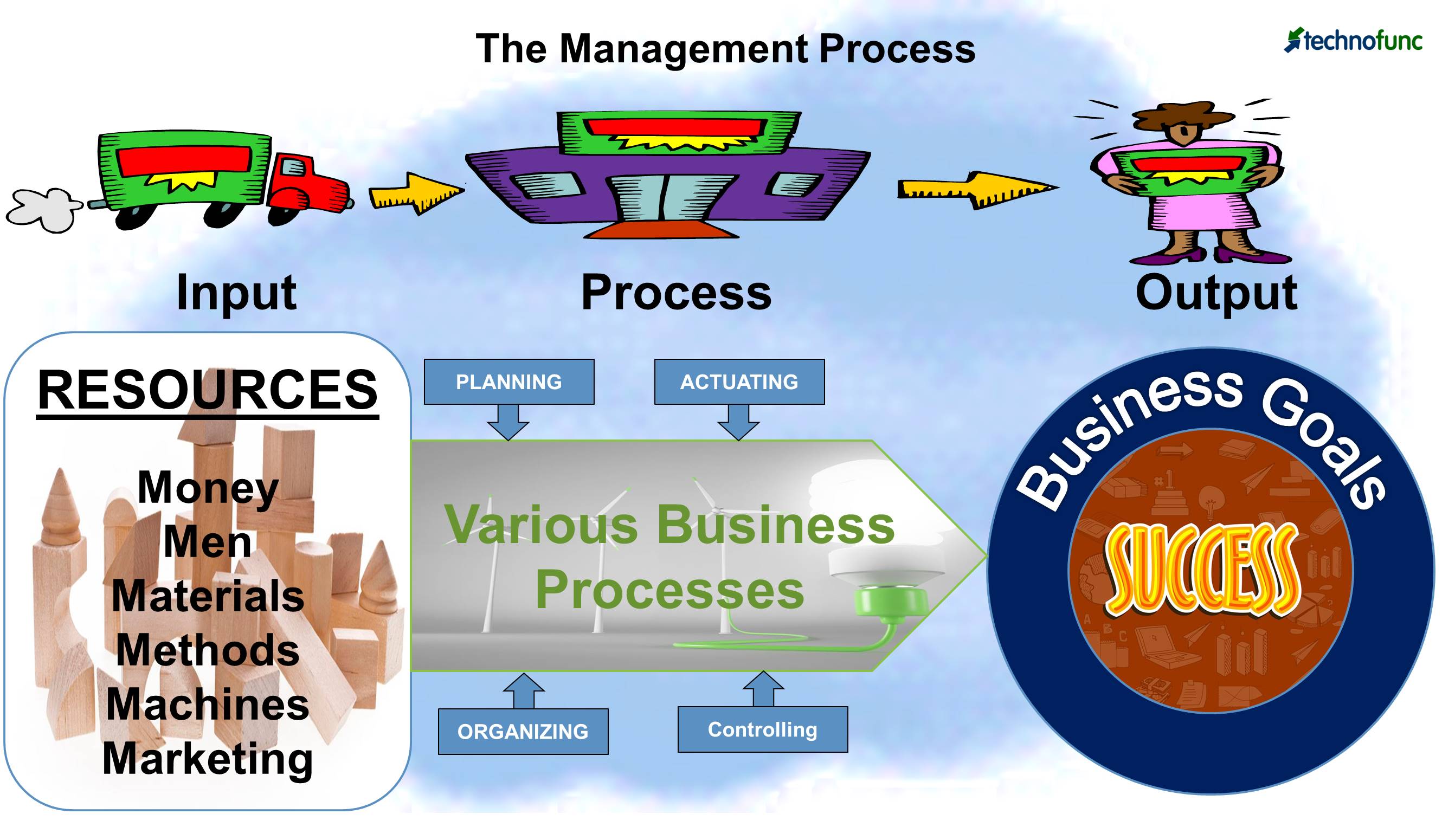- Home
- Business Processes
- Industry Knowledge
- Aerospace Industry
- Automotive Industry
- Banking Domain
- BFSI Industry
- Consumer/ FMCG Industry
- Chemicals Industry
- Engineering & Construction
- Energy Industry
- Education Domain
- Finance Domain
- Hospitality Domain
- Healthcare Industry
- Insurance Domain
- Retail Industry
- Travel and Tourism Domain
- Telecom Industry
- Leadership Skills
- eLearning
- Home
- Leadership Skills
- Leadership & Management
- Concept of Management
Concept of Management
The concept of management refers to the process of planning, organizing, staffing, directing, coordinating, and controlling to achieve organizational goals. It is the management of human, physical, financial, and other valuable resources of the organization in an effective and efficient manner to achieve business objectives.
Different people have conceived and defined management in different ways. But, the essence of management lies in determining worthwhile goals and then carefully selecting and utilizing resources through efficient and effective planning, organizing, actuating, and controlling to achieve those goals.
Who is a Manager?
You are a manager. What does this mean? The word derives from the ancient French word for handling horses and a later one for handling the affairs of the kitchen. Cynics might replace horses with donkey, but all would see the analogy of keeping an organization alive through the activities of the kitchen. Probably the one that is most simple, popular, and often quoted by many in general is "getting things done through other people."
Let us now look at different definitions that highlight important aspects of management.
- Management is a distinct process consisting of activities of planning, organizing, actuating and controlling, performed to determine and to accomplish stated objectives with the use of human beings and other resources (Martin, 1977).
- Good management is merely the exercise of common sense and the Golden Rule (Daniel, 1976)
- The six M’s (money, men, materials, methods, machines, and marketing) of management or the basic resources, as they are often called, are subjected to the fundamental functions of management - planning, organizing, actuating, and controlling -to achieve stated objectives.
- Management is an art struggling to become a science.
- Management science is a body of systematized knowledge accumulated and accepted with reference to the understanding of general truths concerning management.
- The art of management is a personal creative power plus skill in performance. The contemplation of problems, events, and possibilities develops personal creative power, while experience, observation, and study of results contribute to skilled performance. It other words, management art involves envisioning an orderly whole from chaotic parts, communicating the vision, and achieving the goal. It is the "art of arts" because it organizes and uses human talent (Boehringer, 1975)

From these definitions, we can infer that the principles and the techniques of management are not only applicable to the business world but they can be equally applied universally. They also find application in social, religious, charitable, and non-profit organizational contexts.
Essentially we can conclude that management is the integration of human and other resources in a manner that leads to effective utilization and harmonization of the individual efforts with organizational goals.
Suggested Reading and Resources
Related Links
You May Also Like
-
Productivity is defined not in terms of the number of goods produced, but in terms of value-added per employee. Customers don’t really buy goods and services but in fact, they buy a value - something they value. The future is all about tangible products fulfilling intangible needs. Ideas like this can transform a business and provide them a competitive advantage to thrive in the future.
-
Power is the ability to exercise influence or control over others. Leadership involves authority and it is very important for leaders to understand what type of power they're using. The 5 Types of Power in Leadership are Coercive power, expert power, legitimate power, referent power, and reward power. Authority is the right to command and extract obedience from others. It comes from the organization and it allows the leader to use power.
-
The best career choices are ones that match your values. Each person has several values that are important to him. These values are highly personal and knowing them provides a clearer sense of what's most important to you in your life and career. Career values are the beliefs you consider important from a work standpoint. Values help you understand what you want from a job? Explore a few examples of work values that can influence career path and job satisfaction.
-
Management Principles by Fayol
Henri Fayol (1849-1925), a French industrialist and a prominent European management theorist, developed a general theory of management. Fayol outlined the fourteen principles of management.
-
Taylor’s Scientific Management
Taylor’s theory of scientific management aimed at improving economic efficiency and labor productivity. Taylor had a simple view that money motivated people at work. He felt that workers should get a fair day's pay for a fair day's work, and that pay should be linked to the amount produced. He introduced the differential piece rate system, of paying wages to the workers.
-
McClelland's Theory of Needs is a human motivation theory which states that an individual's specific needs are acquired over time through our culture and life experiences. As per the three needs theory, these acquired needs significantly influence the behavior of an individual. The three main driving motivators are the needs for achievement, affiliation, and power.
-
Principles of management are fundamental concepts and advisory guidelines for managerial decision making. By using management principles, managers can more easily achieve the objectives and avoid making mistakes in their activities. Management principles can be applied to any kind of organization and to managers at all organizational levels.
-
Process & Stages of Creativity
Creative ideas do not come just like that. There is a process to it. There are a number of techniques of creativity to support the generation of ideas but the widely practiced ones are brainstorming and lateral thinking. Most innovations are not so much the product of sudden insights as they are the result of a conscious process that often goes through multiple stages. The creative process can be divided into four stages of preparation, incubation, evaluation, and implementation.
-
Team leadership theory is a recent leadership theory that does not discriminate between the leader and the other team members. The approach considers contributions from each team member to be critical for organizational success. This approach focused on the overall team effectiveness and team problems are diagnosed and action is taken to remediate weakness. This approach provides for taking corrective action when the leader deems necessary.
-
Thinking & Problem Solving Skills
Today's dynamic business world demands that you make decisions that significantly boost productivity and drive competitive advantage. But how do you know whether a decision will benefit the organization? And how do you know that the decisions are based on rational and statistical reasoning? Explore how to become a dynamic problem solver with the skills to make accurate decisions.
Explore Our Free Training Articles or
Sign Up to Start With Our eLearning Courses

About Us
Learning
© 2023 TechnoFunc, All Rights Reserved










